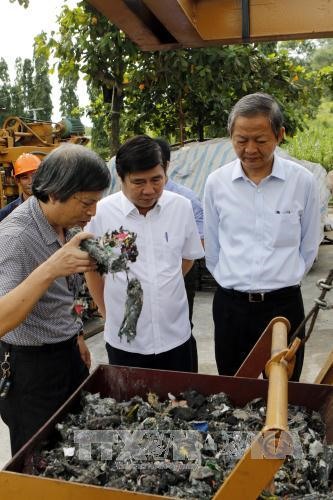 Environment
Environment

HCM City is creating favourable conditions for investors to reuse and recycle garbage to produce electricity, according to Nguyễn Thành Phong, Chairman of the city People’s Committee.
 |
| Authority officials from HCM City People’s Committee visit the Gò Cát Solid Waste Treatment Complex in Bình Chánh District, which is recycling rubbish to generate electricity. — VNA/VNS Photo Hoàng Hải |
HCM CITY — HCM City is creating favourable conditions for investors to reuse and recycle garbage to produce electricity, according to Nguyễn Thành Phong, Chairman of the city People’s Committee.
The official made his announcement last week while visiting a plant that recycles garbage to produce electricity at the Gò Cát Solid Waste Treatment Complex in Bình Chánh District.
Around 1.5 million tonnes of solid waste from industry, and 8,300 tonnes of garbage from household activities are discharged every day in the city, Phong said. The volume will increase as the population grows and the economy develops.
The city aims to halve the amount of buried solid waste by 2020, with the rest recycled to produce energy and compost.
Pilot project
Recycling at Gò Cát Solid Waste Treatment Complex is being done on a trial basis with technology developed by Vietnamese scientists.
A representative of Hydraulic Machine Co said the People’s Committee should expand treatment to a capacity of 1,000 tonnes of garbage per day. The company is working with the HCM City Urban Environment Co. to pilot the recycling of garbage to produce electricity.
Phong said the committee had approved investment for a plant to produce energy on a larger scale and that the Department of Natural Resources and Environment would evaluate results of the pilot.
The companies involved must carefully consider the environmental impact of each energy production project, he added.
Nguyễn Toàn Thắng, head of the city’s Department of Natural Resources and Environment, said the Gò Cát Solid Waste Treatment Complex, which covers 25 ha, stopped receiving garbage in 2007. The total volume of garbage at the facility at that time was 5.3 million tonnes.
The HCM City Urban Environment Co was assigned to operate and manage the complex. The company is permitted to store non-hazardous industrial solid waste, which is transported to the 45-ha Đông Thạnh Waste Treatment Complex in Hóc Môn District and other facilities.
Earlier this year, the company studied the recycling of garbage into energy in Hà Nam Province and submitted a proposal to the HCM City People’s Committee for approval of pilot production at the Gò Cát Solid Waste Treatment Complex.
If the pilot production is a success, technologies created by Vietnamese scientists will be used by other waste treatment companies in the city, Thắng said.
Nguyễn Gia Long, general director of Hydraulic-Machine Co, said the installment of systems for pilot production began in March.
Clean energy
Rubbish at the plant is at first separated and all metal is taken out. The refuse is then pressed into pellets which can be converted into synthetic gas and “clean coal” used to fuel internal combustion engines.
The system has a closed automatic production line, which results in heating with less oxygen and no pollutants.
Renewable energy from garbage began to be officially used for the national grid in April, he said.
The pilot plant has treated 500 tonnes of industrial garbage so far and produced 7MW, he said, adding that generated power was being used for the national grid and the plant’s lights.
Nguyễn Phương Đông, deputy director of the city’s Department of Industry and Trade, said that under the city’s 2015-2025 electricity development plan, the city targets producing 100MW of clean energy using biomass, wind and garbage, as well as solar power.
Currently, renewable energy from garbage comes only from the Gò Cát pilot plant, Đông said.
Since its capacity is low, it is necessary to increase the output of energy from garbage to reach the city’s target, he added.
Lê Văn Khoa, deputy head of the city People’s Committee, said the two companies should also develop other ways to recycle waste to generate power. The goal is to reduce the amount of buried waste in the city as much as possible, he added. —VNS




